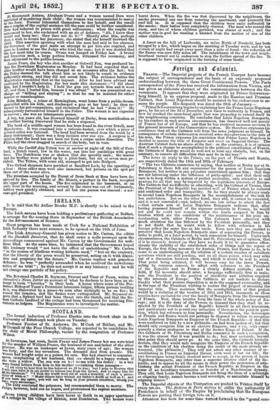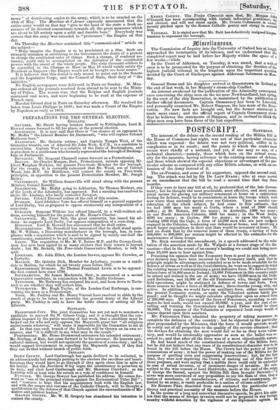i fortign anti Colonial.
FRANcE.—The Imperial projects of the French Usurper have become the subject of correspondence and the basis of an expressly proposed understanding between the three Great Continental Powers. The Paris correspondent'of the Times has received the information from Vienna, and has given an elaborate abstract of the communications between the Go- vernments. It appears that they were originated by Prince Schwarzen- berg himself, in an express proposal made to the Russian and Prussian Cabinet, that Louis Napoleon should be assisted in his endeavours to as- sume the purple. His despatch was dated the 29th of January- " Prince Schwarzenberg begins by explaining how the Prince Louis Napoleon gave, by his act of the 2d of December, new force to authority in France, and how he crushed the anarchical spirit that was preparing to extend itself in the neighbouring countries. He concludes that Louis Napoleon Bonaparte, by his conduct in such serious circumstances, has deserved well merely of France but of all Europe, and'that he has rendered immense services to the general interests of the Conservative system. He therefore expresses his confidence that all the Cabinets will form the same judgment as himself. In consequence of certain information received some days previous to the date of his note, the Prince expresses his conviction that Prince Louis Napoleon is decided to assume the title of Emperor and erect an Imperial throne. The Austrian Cabinet feels no alarm at the fact : on the contrary, it is of opinion that if such a ohange be accomplished in the political constitution of France, the Cabinets of Europe would do well not to raise any obstacle, but, on the contrary, to remove all difficulties that may lie in the way."
The notes in reply to the Prince, on the part of Prussia and Russia, are respectively dated the 18th anc129th of Februaly.
"The two Cabinets commence by saying, that neither at Berlin nor at St. Petersburg is there felt any engouement for the person of Louis Napoleon Bonaparte, but neither is any prejudice entertained against him ; that they i are not labouring under the influence of patty-spirit; and that their only care is to keep within a system of perfect neutrality, only attentive to and anxious for all that may be required by the legitimate interests of Europe. The Cabinets feel no difficulty in admitting, with the Cabinet of Vienna, that the President of the Republic has merited well of Prance when he restored and confirmed order and tranquillity. So far they should be always ready to second Louis Napoleon Bonaparte in the accomplishment of the task he has undertaken. But on the other hand, they'add, it cannot be concealed, and it is not eoneealed—and, indeed, no one can refuse to admit the fact —that certain acts of Louis Napoleon Bonaparte indicate that, after haring possessed himself of the supreme authority in France, he would not and he could not remain within the limits assigned to him by treaties which are the conditions of the maintenance of his good un- derstanding with other Powers. The Cabinets have observed with Much attention the line followed by the President personally, and they do not doubt that he world wish to follow with reference to his foreign policy the same line as his uncle. Even now they are enabled to perceive that Louis Napoleon Bonaparte aims at separating the Powers, in Order to profit, at a later period, by such separation for himself. Under such circumstances, the Cabinets of Berlin and St. Petersburg are of opinion, that if it be sincerely desired (as they have no doubt it is) to guarantee effica- ciously the stability of the established order of things and the repose of Europe, the first thing necessary for Austria, Prussia, and Russia to do, is to come to an understanding on the solution of a Certain ntnnber of subaltern questions which are still pending, and on all those points which may arise out of a discussion between them, and which it would be well to avoid. That point being attained, it will become easy for the -three Powers, acting by common concert, to adopt with reference to the President of the Republic and to France a Clearly defined attitude; and to hold, if the necessity should arise, a language sufficiently firm to main- Min the President in the position of inactivity and isolation required by the interests of Europe. The Cabiacts do not hesitate to declare frankly what their present disposition is at to The supposed eventuality, add in the case of the President wishing to realize the 'project of airsommg the Imperial title. They maintain that the accotoplishinent of that project would be a violation of the treaties of 1814 and 1815, inasmuch as those treaties have excluded for ever the family of Bonaparte from the Government of France. Now, those treaties form the basis of the whole policy of Eu- rope; and it is the dilly of the Powers to demand that they than be re- spected by the President of the Republic himself in all their provisions, and particularly not to permit any infraction -if them as to the pointin ques- tion, which has reference to him personally. Nevertheless, the Sovereigns of Prussia and Russia would not perhaps be disposed to refuse to recognize Louis Napoleon Bonaparte as Emperor of the French Republic—if that title were conferred on him by a new plebiscite—ars had been spoken of; but they should only recognize him as an elective Emperor, and d vie, with conse- quently a status analogous to that of the former Kings of Poland. If the two Cabinets of St. Petersburg and Berlin consented to such a recognition, it was the utmost that it was possible to do ; but, moat certainly, beyond that point they should never go. At the same time, the Cabinets formally declare, that they would only recognize the Emperor of the French Republic on the condition of his election being the result of the mode already, an- nounced, (the plebiscite.) They will not admit any other manner of re- establishing in France an Imperial throne, even were it but for life the two Sovereigns being firmly resolved never to accept, in the person of Louis Napoleon Bonaparte, any other than a supreme elective chief of the Re- public, and to oppose by all the means in their ctreer the pretension of esta- blishing the actual President of the French ablic as Emperor in the sense of an hereditary transmitter or forinder o a Napoleoman dynasty. They add, that Louis Napoleon Bonaparte not being the issue Of a sovereign or reigning family, cannot become a real sovereign, Or assimilate himself to reigning houses.' The Imperial object's of the trardpation are itirtshed In France itself by ere/ Means. The alle'titi de P'i'ts atriVes VI enlist the nationality Of Frenchmen in beim I' of the Empire hy 'proclaiming that the European t Poivere are putting t eir foreign Veto on it. Attention has been for some time tutted forward to the ugrand cere- moray " of distributing eagles to the army, which is to be enacted on the 10th of May. The ifoniteur de 1' Armee expressly announced that the entire army would on that day "give to the head of the state a fresh as- surance of its devoted concurrence towards all the great measures which are about to lift society upon a solid and durable base." Everybody was certain that the army was intended to "pronounce" the Empire on that day. On Thursday the ifoniteur contained this " communicated " article on the subject-
" Many imagine the Empire is to be proclaimed at a fete. Such are strangely mistaken in attributing to the Government the desire of a pretext to change the established order of things. Such a change, if rendered ne- cessary, could only be accomplished on the initiative of the constituted powers with the assent of the whole people. The sixty thousand soldiers to be assembled in the Champs de Mars on May 10 would vainly salute the President as Emperor ; the Empire would not be brought one hour nearer." It is believed that this denial is only meant to point out to the Senate and the Legislative Corps, and the Council of State, their duty of " the initiative."
No English newspapers were delivered in Paris on Sunday. M. Mau- pas ordered all the journals received from abroad to be sent to the Minis- try of Police. The reason was, that the Belgian and English journals contained real news, and were beginning to be read at the expense of French ones.
Marshal Gerard died in Paris on Saturday afternoon. He received his baton from Louis Philippe in 1830 ; but was made a Count of the Empire by Napoleon as early as 1813.



























 Previous page
Previous page